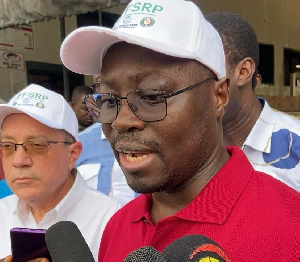Health News of Thursday, 30 October 2014
Source: GNA
Ghana not at risk for hosting UN Ebola team – WHO
The World Health Organisation (WHO) has reiterated that Ghana’s hosting of the United Nations Mission for Ebola Emergency Response (UNMEER) has not exposed the country to any additional risk of Ebola infection.
“The team has been trained to take precautionary measures during operational visit to any of the affected countries of Liberia, Sierra Leone and Guinea.
“The team will continue to observe strict regulations in terms of personal protection,” Dr Isabelle Nuttall WHO Director Global Capacities, Alert and Response Health Security and Environment told the Ghana News Agency in an interview at Geneva, Switzerland.
She therefore debunked public fear in Ghana that the country has exposed its people to possible Ebola virus introduction for hosting the UNMEER, with team members travelling to and from the three Ebola hit countries.
Responding to questions on the precautionary measures a country should adopt to protect people from Ebola infections, Dr Nuttall appealed to other West African Countries which have not yet recorded any infection to scale up their preparedness level.
She said the WHO has issued a Consolidated Checklist for Ebola Virus Disease Preparedness, which is based on efforts by various national and international institutions.
She said no country is protected from a person who may just arrive in the country with Ebola, so what is needed first of all is the national mechanism for national coordination, identify exactly which actors at the high level of the government will be involved in the command and control situation.
“Known as Incident Management Centre or operational centres which should include the Minister of Health, Minister of Communication, and other allied personnel, is also important for that total commitment from the head of state to drive the process.
“Overall coordination – these are all efforts to clarify roles and responsibilities of national authorities and international partners in preparedness activities under a shared set of objectives,” Dr Nuttall stated.
She said the Incident Management Centre will allow minimising duplication of efforts and ensuring maximum impact from limited resources that are currently available.
Dr Nuttall said a country should also set up a Rapid Response Team (RRT) ahead of time; a country should not wait till something happens before putting in place a response team.
She said the RRT group should include epidemiologist and others who can identify disease traced back and understand situation, and other experienced experts to be on stand-by with the logistical capacity to reach any part of the country within 24 hours.
“Their actions will help to contain or stop an outbreak early. They will survey the first case(s), provide health care in a central facility, engage with the community and carry out infection, prevention and control measures.
“As countries will not know exactly in which geographical area a first case will emerge, a fully operational RRT is critical to be able to act immediately a suspicious case is reported. They will act as an initial stabilising resource in the earliest phase of the outbreak,” she said.
Other measures includes: public awareness and community engagement team to promote the understanding of risk communities on Ebola and address any stigma hampering EVD emergency healthcare and effective surveillance.
The WHO Director said Infection Prevention and Control mechanism must also be put in place to ensure safe working conditions within healthcare facilities and social mobilization as well as case management which should involved the setting up of Ebola Treatment Centre (ETC) and Safe Burial Team.
Dr Nuttall said countries must also have a Epidemiological Surveillance system that is a cross-country effective alerting or notification team to immediately investigate a person for potential EVD.
Contact Tracing Mechanism that is the ability to identify and track the chain of contact of infected person to control the transmission within the first 72 hours of reporting a confirmed or suspected case.
“Rapid contact tracing and immediate monitoring is essential to stop or limit the transmission to other people,” Dr Nuttall stated.
She said a country should also set-up a Laboratory to ensure that samples are safely taken and transported to laboratories which are ready to swiftly analyse them. “Rapid confirmation of cases is crucial to contain an outbreak, trace contacts and provide emergency healthcare”.
Dr Nuttall said officials at a country’s entry points must have the capacities to deal with an Ebola case once it occurs...”this includes the preparation of facilities as well as increasing staff capacity.
“An effective targeted screening at Point of Entries will help to prevent cross border transportation of infections”.
Mr Tarik Jasarevic, WHO Communications Officer at the office of the Director General stressed the need for more health workers to assist in the fight against Ebola.
He told the GNA that WHO has deployed close to 700 international experts since the beginning of the outbreak and about 200 WHO staffs on the ground; additionally some countries have also committed personnel to the worse affected countries.
He said Ugandan Doctors who have experiences working with Ebola patients are now working in Liberia.
Mr Jasarevic also noted that the world body is facing logistical challenges, “how to get people moving, supplies moving in a timely manner, WHO have encountered situations where it’s difficult to get seats on available plane, for Conakry for example as the number of weekly flights went down from 57 to 17, because airline companies have decided not to fly there.
“WHO is however working hard with the airline operators to convince them that travel restrictions are not the way forward. We have therefore provided them assurances that their staffs are safe, and that everything has been put in place to ensure that infected people are not allowed to travel or board the plane.
“WHO has put in place system call exit prevention – people who are infected with the Ebola virus are not allowed to board a plane”.
Mr Jasarevic said WHO is also working alongside with the airliner bodies including international organisations of civil aviation, and other airline companies and assuring them that travelling to these countries has minimum risk.
Providing statistics, Mr Jasarevic said currently there are three countries with intense and wide spread transmission of the virus; Liberia, Sierra Leone, and Guinea, two countries that have been declared Ebola free - Nigeria and Senegal, and three countries with infection United States of America, Span and Mali.
Currently there are over 10,000 reported cases out of which close to 500 are health workers and half of them have passed on.
He explained the reason for large number of health workers dying was that at the beginning of the outbreak, people did not know that it was Ebola, as it was the first time West Africa was facing the virus, so health personnel did not take precautionary measures.
“They were treating patients without protection, without proper training and ill-equipped and worked for long shifts.
“WHO want to protect health workers as that is the best way to protect others,” he said.
He said the world body’s goal is to get 70 per cent of infected people properly treated at the health centres, 70 per cent of people who died of Ebola being buried in a safe manner.
“Need to decrease the number of infections as we have seen in Sierra Leone that almost half of the infection was not touching sick persons but through touching dead bodies, this is why we need teams to undertake safe burial.
“Need also to have enough laboratories to ensure that test can be conducted quickly, as health workers need to know quickly whether they have an Ebola patient or a patient with any other sickness, which have close symptoms as Ebola.
“We need to work fast to ensure that as many infected people receives treatment and make sure that infected people are also not out there infecting other people,” he said.
Mr Jasarevic said WHO is also working with affected countries on different levels, through the Ministry of Health, whilst coordinating with a number of partners, including the national Red Cross.












